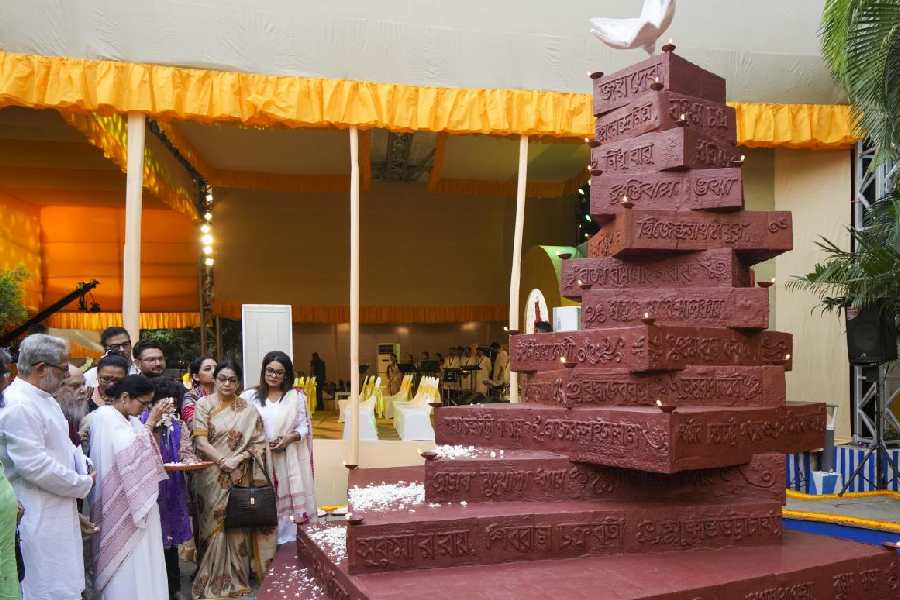Prominent members of Bengal’s civil society decried the unfolding developments under the Muhammad Yunus government in Bangladesh at the International Mother Language Day programme organised by the state government here on Friday.
Chief minister Mamata Banerjee, however, chose not to mention Bangladesh even once in her speech, but read out her poem Shanti (peace) in the address, which could be construed as a veiled message for the neighbours to follow the path of “peace
and harmony.”
“The language in which we speak is our mother tongue.... We love our language. It is the fifth most spoken language in the world. In Asia, it’s the second most spoken language,” said Mamata.
“But we should not talk about any other country. We will talk about our country,” she added.
The chief minister had spoken about Bangladesh several times since the country had got sucked into an unprecedented phase of uncertainty after the fall of the Sheikh Hasina government on August 5.
By the time Mamata gave her advice as the last speaker at the programme, prominent members of Bengal’s civil society had touched on the turn of events beyond the border.
International Mother Language Day is intertwined with Bangladesh (erstwhile East Pakistan), where a popular movement began in the 1950s against the Pakistani authorities’ attempts to make Urdu the national language. On February 21, 1952, police opened fire on students in Dhaka, killing several and injuring hundreds more.
To encourage the preservation and protection of all languages and respect the sacrifices of language martyrs in Bangladesh, Unesco declared February 21 as the International Mother Language Day in 1999. The day has been observed across the globe for the past 25 years and Bangladesh has earned the reputation of organising the most elaborate programmes on February 21.
This year, however, was a departure as the scale and the scope of the programmes shrunk amid a buzz in the neighbouring country that the Yunus regime deliberately did it to downplay Bengali nationalism, which led to a nine-month Liberation War with Pakistan and gave birth to an independent Bangladesh.
“As this is the 25th year, the United Nations urged the world to celebrate the day in a grand manner. But we see with despair what’s happening in Bangladesh,” said poet Subodh Sarkar, obliquely referring to multiple incidents of attacks on programmes in memory of the language martyrs and the muted observance of the day this time.
Reports from Bangladesh suggested that Islamist elements, in the garb of a fledgling students’ body, did not allow some prominent leaders of the BNP to visit Central Shahid Minar to pay tribute to a memorial of the language martyrs. Multiple sources in Bangladesh said the students’ forum — known as the backbone of the Yunus regime —tried to prevent President Mohammed Shahabuddin from visiting the memorial on Thursday night.
“The normal practice of a message from the President on the occasion of February 21 to all consular offices across the globe was also discontinued this year.... Although there was a message from Yunus, it was silent on Bengali nationalism, which gave us our identity,” said a source in Dhaka.
At the Bengal government programme, painter Jogen Chowdhury, a former Trinamool Congress MP, tried to offer a reason for the changes that Bangladesh was witnessing under Yunus.
“The new government in Bangladesh is cosying up to Pakistan, forgetting their history. How can that happen?” he said.
Writer Abul Bashar came up with the answer and said Bangladesh seemed to be in a state of “confusion” and “lost itself” under the new regime. “Renowned Bangladeshi poet Al Mahmud wrote a poem, Nolok, in 1980. The poem is about the mother losing her nose ring, which can be compared with losing identity and freedom. This poem has become so relevant in today’s context in Bangladesh,” he said.










